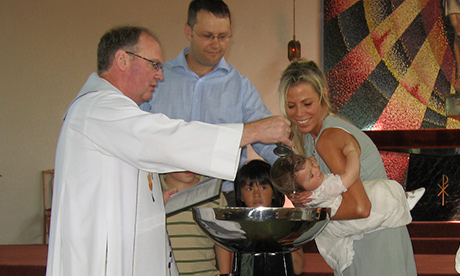The great doorway to growing in the Christian faith is narrowing from year to year in Quebec as baptisms have significantly declined in since 2012 and there’s no indication the trend will reverse.
Confronted with a shift away from traditional practices of transmitting the faith in childhood, leaders in the Quebec church are rethinking how to approach children’s spirituality.
Data compiled by the Assembly of Catholic Bishops of Quebec shows the number baptisms declined from 42,213 (of 88,933 births) in 2012 to 30,394 (of 83,900 births) in 2017. The figures represent a 28% decline in five years.
Clement Vigneault, director of the Catechesis Office of Quebec, is closely monitoring the situation. Before the question of baptizing and catechizing children is even raised, he sees a growing concern — especially among grandparents — to consider the spiritual life of children.
“There’s a trend of waiting to baptize children in order to give them the opportunity to choose later,” he said.
“But how will they choose if they have never been accompanied in their spiritual life?”
Elaine Champagne, associate professor of theology and religious studies at Laval University, has been working on children’s spirituality for several years. It was while working in pediatric health care for eight years that she developed her interest in the topic.
She noted that spiritual care in health facilities was mainly oriented toward parents and that children sometimes were forgotten.
She said, however, that being interested in this “sacred, very personal space” in children is just as important.
“You have to be respectful and listen a lot,” Champagne said.
Champagne’s research has enabled her to identify three modes to better grasp children’s spirituality in everyday life.
The “existential” mode is interested in how they live in the present.
In the “sensitive” mode, children communicate with their bodies and senses.
“Something is said all over their bodies. The whole body expresses it, their being is coherent,” Champagne said.
In the “relational” mode, it’s about the relationship to oneself, to others, to God and to one’s environment.
Champagne invites adults to go beyond the image they many have of children’s spirituality, which is sometimes made up of projections.
Certainly, the children have a “beautiful capacity for wonder,” but it’s also necessary to know how to respect that “in this state of becoming, there’s fragility, a dependence.”
The Rev. Jean-Daniel Williams is working on a doctorate in practical theology on children’s ministries.
As a part-time chaplain at McGill University and an associate priest at the Anglican Christ Church Cathedral in Montreal, he works with children of all ages.
“There’s of course a difference between a 3-year-old and a 10-year-old child. However, it should be emphasized that children are completely human from the beginning. If we see children as adults in the making, we don’t respect the reality of their current spirituality,” he explained.
For Rev. Williams, children are the “most spiritual beings in the world” simply because they ask so many questions.
“It’s a bit cliche to talk about children always asking, ‘Why,’” he said.
“But isn’t the very foundation of religion people asking, ‘Why?’”
Curiosity and openness are, he said, two distinct marks of children’s spirituality. Continue reading
Additional readingNews category: Analysis and Comment.




